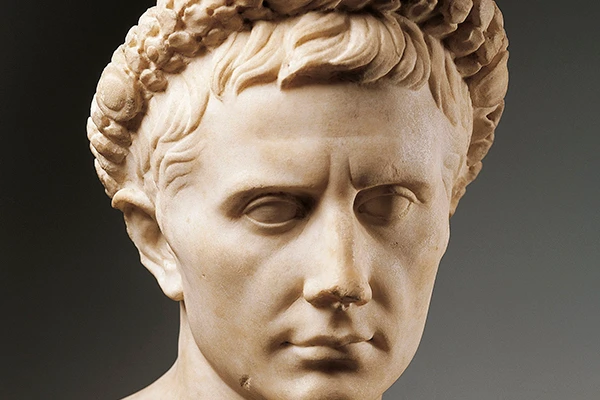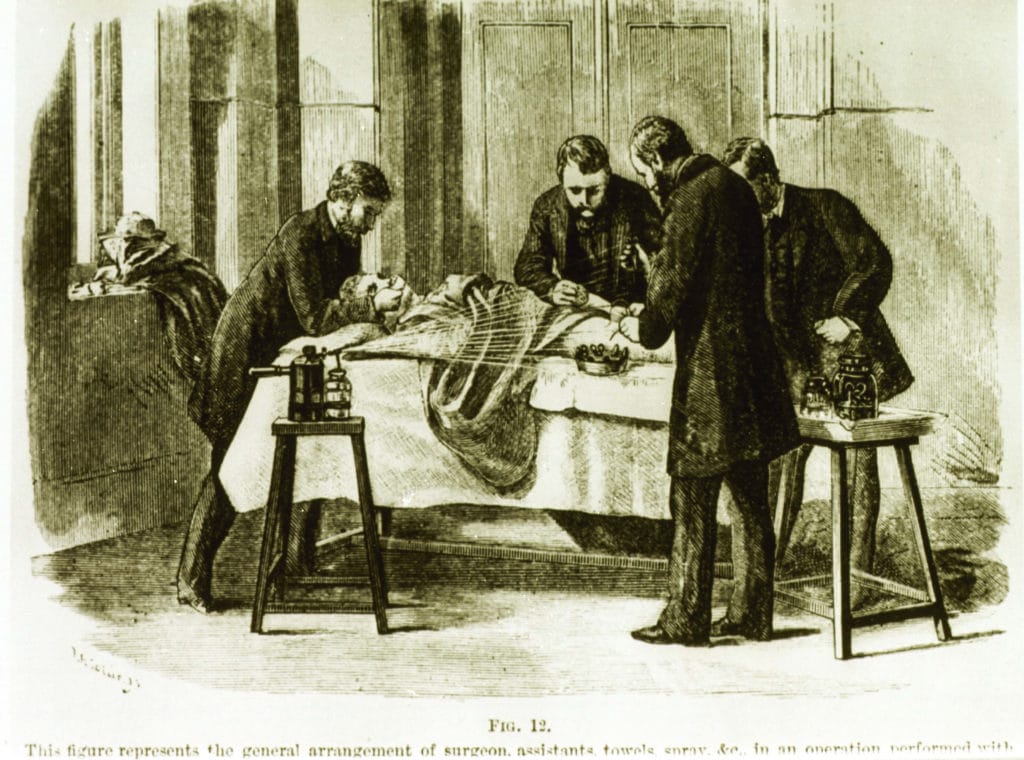During 2023, the landscape of historical literature was enriched by a diverse range of compelling and insightful books.
These publications, hailed as some of the best history books of the year, stand out for their thorough research, engaging narratives, and innovative perspectives on past events.
1) Black Ball: Kareem Abdul-Jabbar, Spencer Haywood, and the Generation that Saved the Soul of the NBA by Theresa Runstedtler
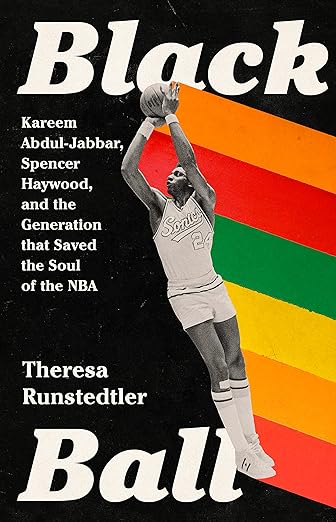
Theresa Runstedtler’s “Black Ball” stands as a captivating journey through the transformative era of basketball legends Kareem Abdul-Jabbar and Spencer Haywood.
As one of the standout history books of 2023, Runstedtler’s meticulous research and engaging prose unravel the challenges faced by these icons and their pivotal role in reshaping the NBA.
Set against the backdrop of racial resistance and calls for Black Power, the 1970s NBA became a battleground for societal tensions. “Black Ball” serves as a vital corrective to misconceptions surrounding this period, dismantling negative stereotypes imposed on Black players.
Runstedtler expertly reveals how these athletes were unfairly blamed for the perceived decline of pro basketball, offering a corrective narrative history that challenges the notion of Black players as culprits in the sport’s supposed downfall.
Runstedtler weaves her deep knowledge of the game with incisive social analysis, presenting a compelling argument that the 1970s were pivotal to the rise of the modern-day NBA.
The improvisational style from neighborhood playground courts and the challenge to team owners’ autocratic power laid the foundation for the global popularity and profitability of the league today.
“Black Ball” is a testament to Runstedtler’s ability to intertwine sports history with social dynamics, providing readers with more than a glimpse into the challenges faced by these trailblazing athletes. This gripping history captures the pulse of a generation, serving as an essential corrective to misinformed narratives.
As Runstedtler masterfully rewrites basketball’s “Dark Ages,” “Black Ball” secures its well-deserved place among the best history books of 2023—a slam dunk into the heart of history, reminding us that the true soul of the NBA was shaped by the resilience and brilliance of its Black players.
2) Anansi’s Gold: The Man Who Looted the West, Outfoxed Washington, and Swindled the World by Yepoka Yeebo
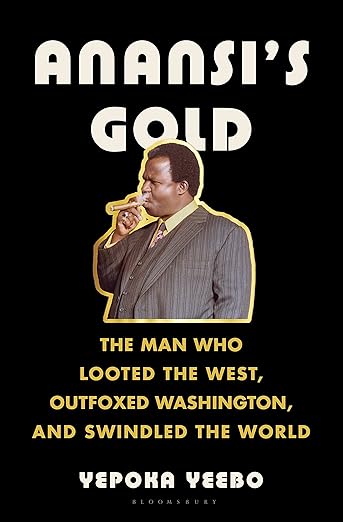
Yepoka Yeebo’s “Anansi’s Gold” is a book that blurs the line between audacious scam and historical heist in an exhilarating narrative that has earned its place as a New Yorker Best Book of the Year.
Described by The Boston Globe as a “fascinating story brilliantly told” and hailed by the Philadelphia Inquirer as a “non-fiction masterpiece,” Yeebo’s work unveils the astounding tale of Ghanaian con artist John Ackah Blay-Miezah—a trickster rivaling the legendary Anansi.
Set against the backdrop of Ghana’s post-independence struggles, Blay-Miezah exploits the chaos, posing as the custodian of an alleged Nkrumah trust fund.
Yeebo skillfully unravels the layers of deception woven by this charismatic scammer, revealing how he outfoxed Washington, deceived international financiers, and manipulated global affairs for personal gain. The narrative unfolds against a Cold War backdrop, exposing the entanglements of politics, finance, and postcolonial betrayal.
Yeebo’s storytelling prowess transforms a complex web of political machinations into a captivating story with contemporary relevance. “Anansi’s Gold” is not just a history book; it’s a journey into the annals of deception and cunning, leaving readers questioning the fabric of historical narratives.
In this non-fiction masterpiece, Yeebo demystifies historical intrigue, making “Anansi’s Gold” a compelling addition to the best history books of 2023.
3) The Story of Art Without Men by Katy Hessel
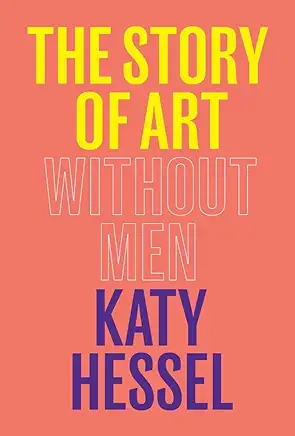
Katy Hessel’s “The Story of Art Without Men” is a revelation in art history, an exploration that reshapes our understanding of the often-overlooked contributions of women artists. From the first known Florentine female Renaissance artist, Plautilla Nelli, to contemporary creators, Hessel unveils a kaleidoscope of artistic brilliance that spans centuries and continents.
An instant New York Times bestseller, “The Story of Art Without Men” goes beyond conventional boundaries, introducing readers to the Dutch Golden Age, postwar artists in Latin America, and the women defining art in the 2020s.
Hessel’s narrative not only overturns our sense of art history but opens our eyes to the myriad art forms often dismissed or ignored.
Guided by Hessel’s expertise as an art historian and founder of @thegreatwomenartists, this book is a kaleidoscope of more than 300 works of art. From the Cornish coast to Manhattan, Nigeria to Japan, Hessel unveils the history of art as it’s never been told before.
“The Story of Art Without Men” is not just a book; it’s a revelation, an ode to the brilliance that thrived beyond the canvas of conventional history. This book is a must-read for anyone ready to embark on a journey through the hidden canvases of artistic brilliance that have shaped our world.
4) The Lumumba Plot: The Secret History of the CIA and a Cold War Assassination by Stuart A. Reid
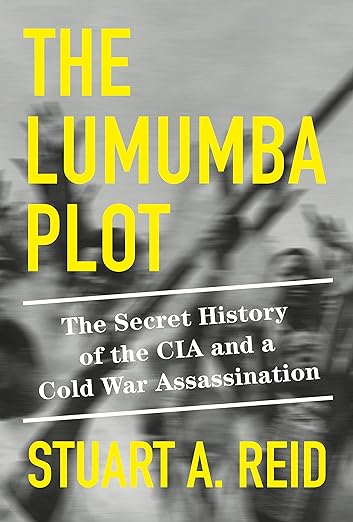
Stuart A. Reid’s “The Lumumba Plot” immerses readers in the clandestine corridors of the Cold War, where the covert operations surrounding the assassination of Patrice Lumumba unfold with gripping detail.
With meticulous research, Reid exposes the hidden layers of political intrigue and power dynamics that shaped this pivotal moment in history.
This spellbinding work reads like a Cold War spy thriller, offering a glimpse into the U.S.-sanctioned plot to assassinate the democratically elected leader of the newly independent Congo.
Reid’s storytelling transcends the page, challenging readers to reevaluate their understanding of Cold War history. “The Lumumba Plot” is not just a history book; it’s a journey into the heart of Cold War intrigue, a tale so wild and gripping that it’s a stark reminder that, indeed, it happened.
5) Humanly Possible: Seven Hundred Years of Humanist Freethinking, Inquiry, and Hope by Sarah Bakewell
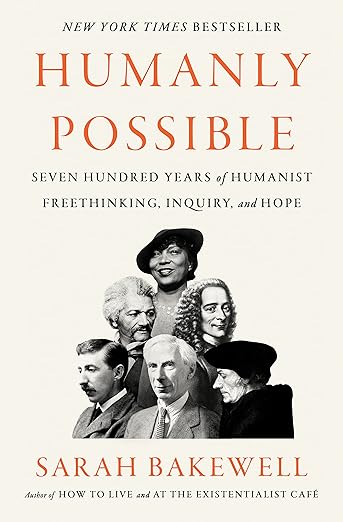
Sarah Bakewell’s “Humanly Possible” unfolds the tapestry of humanist freethinking, inquiry, and hope across seven centuries. Quickly becoming a New York Times bestseller, Bakewell’s work is a magnum opus that transcends time and tradition..
The narrative links philosophical reflections with vibrant anecdotes, creating a compelling intellectual adventure for readers. Bakewell navigates the history of humanism, celebrating the shared humanity, cultural vibrancy, and moral responsibility that have inspired thinkers, scientists, and artists for centuries.
“Humanly Possible” is not just a great read; it’s an intoxicating celebration of the human spirit, showcasing Bakewell’s ability to synthesize complex ideas into a compelling narrative.
6) Road to Surrender: Three Men and the Countdown to the End of World War II by Evan Thomas
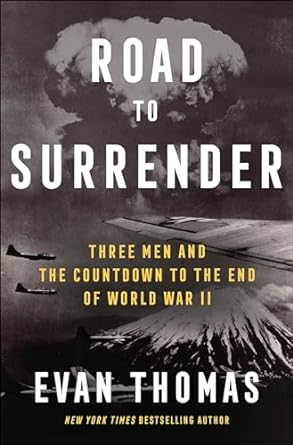
In Evan Thomas’s “Road to Surrender,” the agonizing decision to unleash nuclear weapons against Japan unfolds with riveting immediacy, marking a crucial turning point in World War II.
Thomas, a New York Times bestselling author, immerses readers in the suspenseful history of three pivotal figures intimately involved in America’s decision to drop the atomic bomb and Japan’s subsequent surrender.
The narrative follows General Groves, Secretary of War Henry Stimson, and Gen. Carl “Tooey” Spaatz in the crucial hours leading up to the fateful decision.
Thomas skillfully draws on new access to diaries, bringing to life the inner workings of minds grappling with the unimaginable. Stimson, overseeing Oppenheimer under the Manhattan Project, finds himself burdened with the decision to deploy the bomb. Spaatz, head of strategic bombing in the Pacific, orders the planes that will deliver the catastrophic payload.
The book delves into the depths of their thoughts, feelings, and motivations, highlighting the immense weight of the historic decision.
Truman’s acceptance of Stimson’s recommendation, Spaatz’s agonizing command, and Foreign Minister Togo’s persuasion of the emperor to surrender are all meticulously explored.
“Road to Surrender” is an immersive, surprising, and moving account that lays bare the behind-the-scenes dynamics of three individuals who shaped history.
7) Sacred Foundations: The Religious and Medieval Roots of the European State by Anna M. Grzymala-Busse
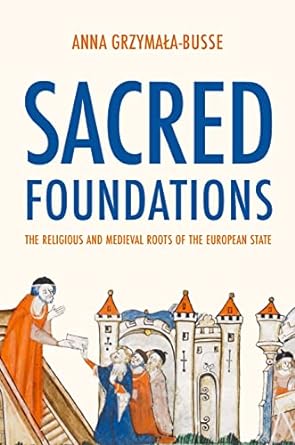
Anna M. Grzymała-Busse’s “Sacred Foundations” delves into the intricacies of the medieval church’s role in shaping European state formation.
Challenging existing accounts, Grzymała-Busse offers a fresh perspective that goes beyond conventional narratives of early modern warfare or contracts between rulers and the ruled.
From the eleventh century onward, the papacy emerged as a force challenging European rulers, seeking autonomy and authority over people, territory, and monarchs.
Grzymała-Busse’s meticulous research unveils the conflicts, excommunications, and ecclesiastical innovations that shaped the European state. “Sacred Foundations” reveals how the challenge and example of powerful religious authorities catalyzed the development of secular state institutions.
8) A Fever in the Heartland: The Ku Klux Klan’s Plot to Take Over America, and the Woman Who Stopped Them by Timothy Egan
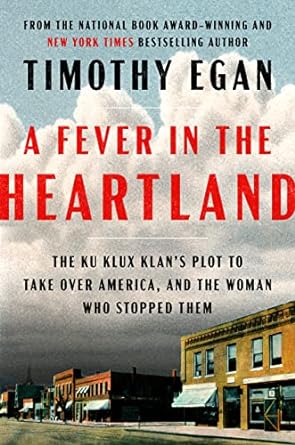
Timothy Egan’s “A Fever in the Heartland” propels readers into the heart of a gripping tale involving the Ku Klux Klan’s insidious plot to take over America during the Roaring Twenties.
In this instant New York Times bestseller, Egan masterfully navigates a transfixing narrative that reveals the rise of a charismatic con man, D.C. Stephenson, and the woman, Madge Oberholtzer, whose courage brought the Klan to its knees.
As Grand Dragon of Indiana, Stephenson orchestrated a strategy that propelled the Klan into the mainstream, with members proudly declaring their allegiance. Yet, at the peak of Klan influence, it was Madge Oberholtzer’s revelations and deathbed testimony that exposed the group’s secret cruelties.
Meticulously researched and brilliantly written, Egan’s storytelling prowess unfolds the tale of the Klan’s ascent to power in the Heartland and the West, fueled by hatred towards Blacks, Jews, Catholics, and immigrants.
“A Fever in the Heartland” marries propulsive drama with a powerful reckoning of one of America’s darkest chapters, offering readers an immersive journey into forgotten stories that resonate with the challenges of societal upheaval.
9) The Rediscovery of America: Native Peoples and the Unmaking of U.S. History by Ned Blackhawk
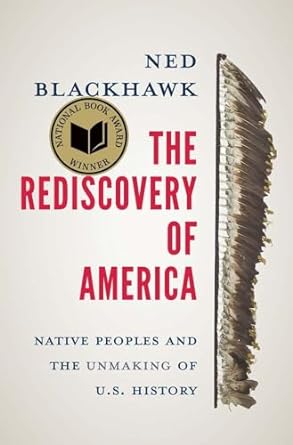
Ned Blackhawk’s “The Rediscovery of America” stands as a transformative work challenging the traditional narrative of U.S. history by placing Indigenous history at its core.
A National Book Award Winner and a National Bestseller, Blackhawk’s book marks a pivotal moment in historical scholarship, urging a conversation-shifting change that is long overdue.
In this eloquent and comprehensive retelling, Blackhawk interweaves five centuries of Native and non-Native histories, highlighting the indispensable role of Native Americans in shaping the evolution of modern America.
From Spanish colonial exploration to the rise of Native American self-determination in the late twentieth century, the narrative unfolds with a profound understanding of the enduring power, agency, and survival of Indigenous peoples.
“The Rediscovery of America” is not just a retelling; it is an invitation to confront often-overlooked aspects of history. Blackhawk’s commitment to reshaping narratives and fostering a deeper understanding of the nation’s past earns this book a prominent place among the best new history books of 2023.
It is a compelling and essential read that challenges conventional perspectives and contributes to a more holistic understanding of America’s complex and multifaceted history.
10) Blood Memory: The Tragic Decline and Improbable Resurrection of the American Buffalo by Dayton Duncan, Ken Burns
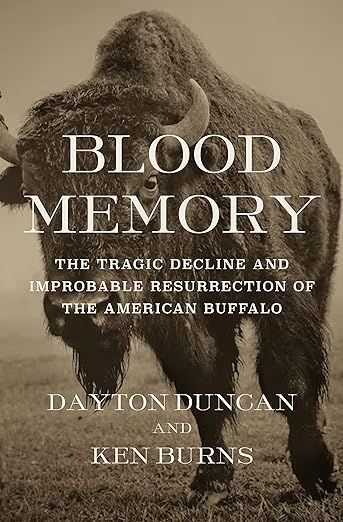
Enter the captivating narrative world that promises an odyssey into the heart of American history. “Blood Memory,” complemented by a compelling two-part documentary, unfurls the epic saga of the American bison—a majestic creature deeply entrenched in the mythos and poignant tales of our nation.
As the largest land mammal in the Western Hemisphere, bison not only weathered a perilous brush with extinction but also coexisted with Native communities for nearly 10,000 years.
Integral to Indigenous life, these creatures were revered as more than mere sustenance; they held a sacred status as equals. However, with the arrival of newcomers, viewing bison as barriers to expansion led to a ruthless mass slaughter, leaving millions to decay on the expansive prairies.
Burns, in collaboration with Dayton Duncan, artfully weaves a narrative that exposes a reckless pursuit to conquer a continent, all while heralding the dawn of the conservation era.
The improbable resurgence of the bison becomes a profound testament to the indomitable spirit of nature and humanity.
“Blood Memory” proudly claims its spot among the premier history books of 2023, providing a poignant reflection on America’s triumphs and tribulations—a vivid reminder of the intertwined destinies shared by a nation and its emblematic symbol.
